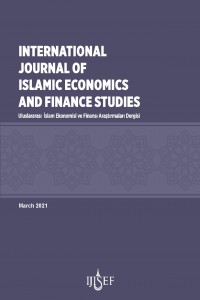Abstract
Day after day, the Competition in the banking sector increases; the customer perspective became significant element in the banking sector. This shows how important it is to determine the point of view and perceptions of the beneficiaries of Islamic banks. The study aims to examine Turks and Syrian customers' preference and behaviors to find out the reasons affect their choosing between Islamic and conventional banks in Turkey. According to the findings; age, occupation, and monthly income influence both Turkish and Syrian customers in Islamic banking preferences. However, the gender does not affect either Turkish or Syrian customers in their selection. Education was found to be an influencer factor for Syrian customers, but not for Turkish. However, after comparing the results of Turks and Syrians, Islamic banking selection-related differences were found between Turks and Syrians with regards to gender, education level, profession, and monthly income, but no age-related differences were found. The research results suggest that there is an effect of bank reputation, customer awareness, service quality, and employee behavior on the customers' preferences toward Islamic banking, whereas the religion factor neither affect Turks nor Syrians. The mass media in Turkey, however, affects the Turks; but does not affect Syrians.
Supporting Institution
Sakarya University
References
- Abbasi, M.,Naeem, M., Saeed, Muhammad, R., (2012). The Tendency of Customers Towards the Acceptance of Islamic Banking in Bahawalpur Region, Pakistan. Research Journal of Finance and Accounting, 3(3).
- Al-Baraka Bank, (2018). Annual Financial Reports. Consolidated Financial Statements. Retrieved from https://www.albaraka.com/en/AboutUs/FinancialHighlights/16/annual-report.
- Atar, A. (2017). From the Past to the Present the General Situation of Islamic Banking in the World and Turkey. History, Culture and Art Studies Journal, 1048 – 1055. DOI: 10.7596/taksad.v6i4.1079.
- Demirdöğen, Y., Özkul, G., Bankacılık İşlemlerinde Katılım Bankaları Tercihini Etkileyen Faktörler: Isparta Örneği, Katılım Finans , Ankara: Gazi Kitabevi, 2018.
- Görmüş, S. Albayrak, A. & Yabanlı, A. (2019). Explaining the Turkish Islamic banking historical development. Yaşayan ve Gelişen Katılım Bankacılğı. TKBB Yayınları.
- Refinitiv, (2019). Shifting Dynamics. Islamic Finance Development Report. Islamic Finance Overview. Retrieved January 27, 2020, from https://www.refinitiv.com/en/islamicfinance.
- Islamic Syria International Bank, (2018). Annual Financial Reports. Consolidated Financial Statements. Retrieved from https://www.siib.sy/en/investor-relations/financialstatements.
- Kaytancı, B. G. Ergeç, E. H. & Toprak, M. (2013). The Banking System Preferences of Participation Bank Customers: Islamic Banking Window for Deposit Banks. International Conference on Eurasian Economies.
- Sham Bank, (2018). Annual Financial Reports. Consolidated Financial Statements. Retrieved January 20, 2020, from https://www.chambank.sy/en/about/financial-statments.
- Syrian Central Statistics Office (2011). Statistical Abstract. Retrieved January 27, 2020, from http://cbssyr.sy/index-EN.htm
- Tekin, B. (2019). The Effect of University Students' Preferences, Perception and Awareness Levels on Participation Banking. Journal of the International Scientific Research, 4(1). 10.21733/ibad.496489.
- Thomson Reuters, (2019). Building Momentum. Islamic Finance Development Report. Retrieved January 27, 2020, from https://www.salaamgateway.com/reports.
- TKBB, (2019). TKBB Annual Sector Reports. Participation Banks. Financial Statements and Data. Retrieved January 27, 2020, from https://tkbb.org.tr/Documents/Yonetmelikler/TKBB_AR19.pdf.
- Toraman, C , Ata, H , Buğan, M . (2015). A Study on Customer Perception towards the Islamic Banking Operations. Gaziantep University Journal of Social Sciences, 14(4) , 761-779 . DOI: 10.21547/jss.256749.
Abstract
References
- Abbasi, M.,Naeem, M., Saeed, Muhammad, R., (2012). The Tendency of Customers Towards the Acceptance of Islamic Banking in Bahawalpur Region, Pakistan. Research Journal of Finance and Accounting, 3(3).
- Al-Baraka Bank, (2018). Annual Financial Reports. Consolidated Financial Statements. Retrieved from https://www.albaraka.com/en/AboutUs/FinancialHighlights/16/annual-report.
- Atar, A. (2017). From the Past to the Present the General Situation of Islamic Banking in the World and Turkey. History, Culture and Art Studies Journal, 1048 – 1055. DOI: 10.7596/taksad.v6i4.1079.
- Demirdöğen, Y., Özkul, G., Bankacılık İşlemlerinde Katılım Bankaları Tercihini Etkileyen Faktörler: Isparta Örneği, Katılım Finans , Ankara: Gazi Kitabevi, 2018.
- Görmüş, S. Albayrak, A. & Yabanlı, A. (2019). Explaining the Turkish Islamic banking historical development. Yaşayan ve Gelişen Katılım Bankacılğı. TKBB Yayınları.
- Refinitiv, (2019). Shifting Dynamics. Islamic Finance Development Report. Islamic Finance Overview. Retrieved January 27, 2020, from https://www.refinitiv.com/en/islamicfinance.
- Islamic Syria International Bank, (2018). Annual Financial Reports. Consolidated Financial Statements. Retrieved from https://www.siib.sy/en/investor-relations/financialstatements.
- Kaytancı, B. G. Ergeç, E. H. & Toprak, M. (2013). The Banking System Preferences of Participation Bank Customers: Islamic Banking Window for Deposit Banks. International Conference on Eurasian Economies.
- Sham Bank, (2018). Annual Financial Reports. Consolidated Financial Statements. Retrieved January 20, 2020, from https://www.chambank.sy/en/about/financial-statments.
- Syrian Central Statistics Office (2011). Statistical Abstract. Retrieved January 27, 2020, from http://cbssyr.sy/index-EN.htm
- Tekin, B. (2019). The Effect of University Students' Preferences, Perception and Awareness Levels on Participation Banking. Journal of the International Scientific Research, 4(1). 10.21733/ibad.496489.
- Thomson Reuters, (2019). Building Momentum. Islamic Finance Development Report. Retrieved January 27, 2020, from https://www.salaamgateway.com/reports.
- TKBB, (2019). TKBB Annual Sector Reports. Participation Banks. Financial Statements and Data. Retrieved January 27, 2020, from https://tkbb.org.tr/Documents/Yonetmelikler/TKBB_AR19.pdf.
- Toraman, C , Ata, H , Buğan, M . (2015). A Study on Customer Perception towards the Islamic Banking Operations. Gaziantep University Journal of Social Sciences, 14(4) , 761-779 . DOI: 10.21547/jss.256749.
Details
| Primary Language | English |
|---|---|
| Subjects | Economics |
| Journal Section | Research Article |
| Authors | |
| Publication Date | March 19, 2021 |
| Published in Issue | Year 2021 Volume: 7 Issue: 1 |
All articles published on IJISEF are licensed under the Creative Commons Attribution 4.0 International License. This license grants you the right to reproduce, share and disseminate data mining applications, search engines, websites, blogs, and all other platforms, provided that all published articles, data sets, graphics and attachments are cited. Open access is an approach that facilitates interdisciplinary communication and encourages different disciplines to work with each other.


